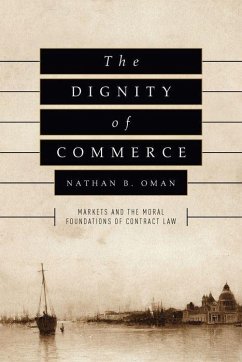Why should the law care about enforcing contracts? We tend to think of a contract as the legal embodiment of a moral obligation to keep a promise. When two parties enter into a transaction, they are obligated as moral beings to play out the transaction in the way that both parties expect. But this overlooks a broader understanding of the moral possibilities of the market. Just as Shakespeare's Shylock can stand on his contract with Antonio not because Antonio is bound by honor but because the enforcement of contracts is seen as important to maintaining a kind of social arrangement, today's contracts serve a fundamental role in the functioning of society. With The Dignity of Commerce, Nathan B. Oman argues persuasively that well-functioning markets are morally desirable in and of themselves and thus a fit object of protection through contract law. Markets, Oman shows, are about more than simple economic efficiency. To do business with others, we must demonstrate understanding of and satisfy their needs. This ability to see the world from another's point of view inculcates key virtues that support a liberal society. Markets also provide a context in which people can peacefully cooperate in the absence of political, religious, or ideological agreement. Finally, the material prosperity generated by commerce has an ameliorative effect on a host of social ills, from racial discrimination to environmental destruction. The first book to place the moral status of the market at the center of the justification for contract law, The Dignity of Commerce is sure to elicit serious discussion about this central area of legal studies.
Hinweis: Dieser Artikel kann nur an eine deutsche Lieferadresse ausgeliefert werden.
Hinweis: Dieser Artikel kann nur an eine deutsche Lieferadresse ausgeliefert werden.








